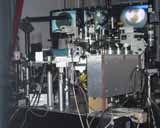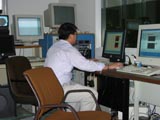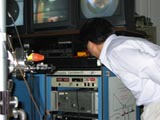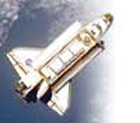Molten samples tend to undercool deeply in absence of heterogeneous nucleation sites that are often present on container walls. Thus, processing without the influence of gravity can be most productive for study of glass-formability. Two ways to do this have been exploited: experiments on board the Space Shuttle, and using an Electrostatic Levitator (ESL). Microgravity allows measuring the Temperature-Time-Transformation (TTT) curves of glass forming alloys, along with their thermophysical properties such as viscosity, specific heat, specific volume, and thermal conductivity as a function of temperature expands our knowledge in the glass forming processes.
Caltech has an Electrostatic Levitation (ESL) facility for containerless materials processing in which sample stays levitated in high vacuum while it is heated, melted, undercooled, and solidified. The ESL that has been developed under NASA’s support was originally intended for materials processing in absence of gravity such as in the Space Shuttles or the International Space Station. However, it was soon realized that it also had many applications for materials research in ground based laboratories.
The Caltech ESL operates in a high vacuum condition
(~10-8 torr). Recently the ESL facility has undergone upgrades that
include: (1) a new levitation control software system with a high
speed (1 kHz) control loop for extremely stable levitation and sample
positioning, (2) addition of new heating lasers that can raise the
sample temperature to 2800 C, and (3) implementation of tetrahedral
heating system using 4 laser beams arranged to accurately irradiate
the spherical sample symmetrically on the 4 axis of a tetrahedron.
In addition to glass-forming alloys the present capability of ESL
is also well suited to investigate various high strength/high-melting
alloys for measurements of their thermophysical properties.



Return to top
For Additional Information, contact
www@matsci.caltech.edu











